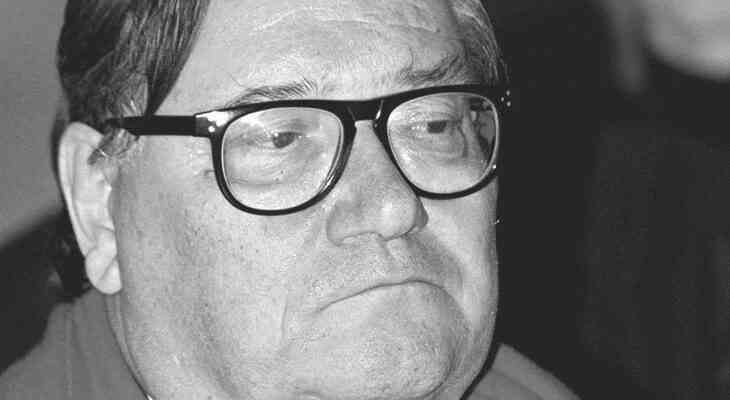It was and is not easy to impress Edmund Stoiber legally. Peter Badura made it without any trouble. Stoiber, himself an excessive lawyer, found in him his conservative master – his master of law. When Stoiber presented the Munich constitutional law professor with the Cross of Merit, 1st class, of the Order of Merit of the Federal Republic of Germany in 2004, the Prime Minister waved the censer in front of Badura like the Chief Minister in front of the Archbishop.
Stoiber, himself famous for his diligence and legal efficiency, praised Peter Badura’s comprehensive, even opulent, almost exploding scientific work in his laudatory speech with audible amazement and the greatest respect: 79 books and comprehensive book contributions in the handbooks and textbooks were up to then, plus more than two hundred essays on fundamental questions of state philosophy and constitutional law, broadcasting law, general administrative law, special administrative law and European law. At that time, at this count, Badura was barely seventy years old and his productivity was still unabated. There is hardly a constitutional problem that he has not commented on profoundly. He was what you would call a luminary.
Badura was unmissable, unmissable, unmissable; not in the legal literature, not at the constitutional law lecturer conferences, not as a legal representative before the Federal Constitutional Court – where he often represented the federal governments led by the Union or the Bavarian state government led by the CSU. In Karlsruhe, the appearance of the stocky, strong man with the distinctive dark glasses was a conservative event – one that will not be forgotten: Badura was combative and he knew how to present his arguments with weight and had a well-dosed pathos. He had a notable influence in conservative circles because of his poised demeanor and omnipresence; he was powerful.
When he got up in the courtroom in Karlsruhe, buttoned his jacket, stretched and stepped up to the lectern, you knew: now things are getting serious. Then he said to the then President of the Constitutional Court, Ernst Benda, that he was now “ready for a kind of verbal battle.” One of those involved said with a grin and somewhat exaggerated: “There was almost a fight”. That was almost forty years ago, in the oral hearing on the census, when Badura was the representative of the federal government and in this role defended the census and the then Federal Minister of the Interior, Friedrich Zimmermann (CSU). Almost offended, he complained in court about the distrust of the census law: “The Biedermeier idyll of the completely undisturbed privacy of the individual is remote from earth or overly disguised egoism, which does not respect the interests of others and in reality even turns against one’s own interests .”
Badura fought against gay marriage and for crucifixes in public buildings
That was not far removed from Badura’s way of thinking. But: Badura and Zimmermann could not prevail. The highest court had 30 million forms for the census prepared by Minister Zimmermann thrown into the shredder – the minister and his legal representative had counted on a lot, but not on data protection and the “right to informational self-determination” newly created by Karlsruhe at the time . Badura’s criticism of this, however, had a long life. He gave legal expression to the feeling that data protection was being overdone.
Badura did not only appear in Karlsruhe against the census law. He represented the CSU government in the crucifix dispute when it came to the crosses in the classrooms. He was of the opinion that a law should order the crosses; only a regulation for the case of conflict had to be supplied later. More recently, Badura has campaigned against gay marriage laws. “It is obvious,” he said, “that the constitution, with its special guarantee of protection for marriage, does not intend to guarantee or encourage different or alternative unions between men and women.” The Constitutional Court saw it differently. Judgment by judgment, it brought same-sex marriage into line with traditional marriage.
When the new Munich airport was built, Badura represented Flughafen München GmbH. In a brief to the Federal Administrative Court, he defended himself eloquently against the city of Freising, which wanted to stop the clearing: “No valuable biotopes were destroyed” by the airport. Was he right? In any case, he was right. In a long interview with Tilmann Steiner from Bayerisches Fernsehen in 1998, Badura said: “Most public law professionals have a certain conservative attitude.” Is that really still true? In any case, with Peter Badura you could be very sure. But he also had the gift of charmingly ensnaring his left-wing or left-liberal opponents.
Until 2002 he held a chair at the LMU Munich
Badura came from Oppeln in Upper Silesia; his father, a lawyer by trade, died on the last day of World War II. The family fled to Franconian Bavaria, Badura graduated from high school in Hof, studied in Erlangen and Berlin, became a full professor in Göttingen in 1964, at the age of just thirty, then went to Munich in 1970, where he held the chair for public law, legal and political philosophy at the Ludwig-Maximilians-University in Munich. The Federal Constitutional Judge Peter M. Huber is the successor to this chair.
Badura lived in Kochel am See, the painter’s home of Franz Marc and the home of the legendary blacksmith von Kochel. Badura has some share in the fact that there is a Franz Marc Museum in Kochel. And the blacksmith from Kochel is a folk hero in Upper Bavaria; he is said to have once rammed the city gate of Belgrade armed only with a pole. That fits: Peter Badura ran against prevailing opinions with his legal expertise. He was Kochel’s lawyer. He died last Wednesday at the age of 88.

